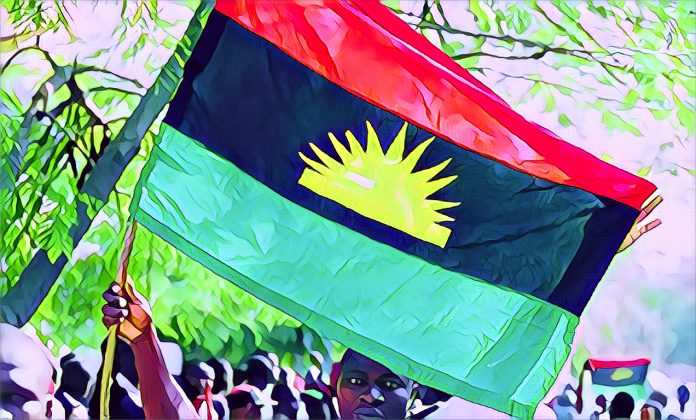The Indigenous People of Biafra (IPOB) has issued a stern warning to anyone planning to stage protests against the economic hardship in the southeast region of Nigeria, saying they will face the wrath of the group.
IPOB: No more protests in Biafraland
The IPOB, a pro-Biafran separatist movement, said in a press statement that the current hardship in Nigeria should be the concern of Nigerians, not Biafrans. The group said it was not interested in the affairs of Nigeria, which it described as a “zoo”.
“Biafrans were abused, intimidated, beaten, and killed and denied voting rights during the election of this present government,” the statement read. “Ndigbo were told to wait until it was their turn to rule, not the turn of Ndigbo.”
The group accused the Nigerian government of sponsoring insecurity, kidnappings, and killings in the southeast region, and vowed to resist any attempt to destabilize Biafraland with “senseless” hunger protests.
“Anyone who organized any protest against economic hardship in Biafraland will put Biafrans in danger,” the statement warned. “We have much on our hands to do. We will not allow anyone or any group to use the arrangement of protests to import more agents of destabilization into our territory.”
The group said its intelligence unit would identify and deal with anyone planning to stage a hunger protest in Biafraland, adding that they would have the Eastern Security Network (ESN) operatives and IPOB volunteers to contend with.
Hunger protests rock other parts of Nigeria
The IPOB’s statement came amid rising discontent and anger over the worsening economic situation in Nigeria, which has been hit by low oil prices, high inflation, and a devalued currency.
On Monday, youths disrupted commercial activities in parts of Ibadan, the capital of Oyo state in southwest Nigeria, in protest over the high cost of living and the scarcity of food items. The protesters carried placards with messages such as “Mr President, this is not the hope you promised”, “End hardship”, and “We want peace”.
The protest, which started at the popular Mokola Roundabout, spread to Adamasingba, Ekotedo, Onireke, Sango, Bodija, Agbowo, and Ojoo, as the security agencies deployed in the areas to prevent a breakdown of law and order. The incident caused a traffic gridlock on the ever-busy roads to Ojoo, Adamasingba and Bodija areas.
The protesters were seen chanting “Ebi n pa wa” (we are hungry) and demanding that the government take urgent steps to make food affordable and available for the masses.
Government appeals for calm
The Nigerian government has appealed for calm and understanding from the citizens, saying it was doing everything possible to address the economic challenges facing the country.
The Minister of Information and Culture, Lai Mohammed, said the government was aware of the plight of Nigerians and was working hard to improve the situation.
He said the government had taken several measures to cushion the effects of the hardship, such as the provision of palliatives, social intervention programs, and stimulus packages for small and medium enterprises.
Lai Mohammed also blamed some of the economic woes on the COVID-19 pandemic, which he said had disrupted the global economy and affected Nigeria’s revenue.
He urged Nigerians to support the government’s efforts and shun any form of violence or agitation that could worsen the situation.
Hope for a better future
Despite the gloomy outlook, some Nigerians have expressed hope that things will get better in the future, as the country recovers from the pandemic and diversifies its economy.
Some analysts have also predicted that Nigeria will experience a positive growth rate in 2024, as the government implements its Economic Recovery and Growth Plan (ERGP), which aims to boost infrastructure, agriculture, and industrialization.
They also called for more reforms and transparency in the management of the country’s resources, as well as the fight against corruption and insecurity.
Finally, they urged Nigerians to remain peaceful and united, and to seek peaceful and democratic means of expressing their grievances and aspirations.
Source: Punch



